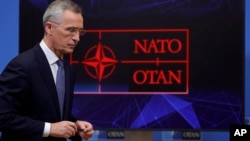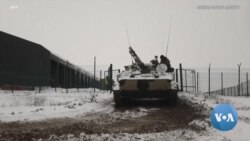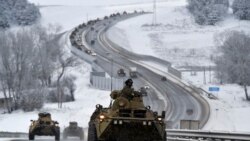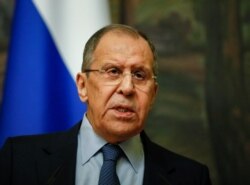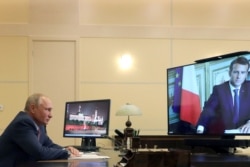NATO Secretary-General Jens Stoltenberg said Sunday the Western military alliance has no intention of sending troops to Ukraine if Russia invades its former Soviet republic, but Moscow said it wants more clarity on exactly what security measures NATO does plan to implement in eastern Europe.
"We have no plans to deploy NATO combat troops to Ukraine...we are focusing on providing support," Stoltenberg told the BBC. "There is a difference between being a NATO member and being a strong and highly valued partner as Ukraine."
NATO has ramped up its military presence in member countries bordering Russia in fear of an imminent Russian invasion of Ukraine with Moscow’s massing of more than 100,000 troops and weaponry along Ukraine’s eastern border.
In the United States, Pentagon spokesman John Kirby told the “Fox News Sunday” show that a Russian invasion “could happen, really, at any time.” Kirby said Russian President Vladimir Putin “continues to add troops” just across the border from Ukraine.
Watch related video by VOA's Arash Arabasadi:
U.S. President Joe Biden and other Western leaders have repeatedly warned they will impose swift and severe economic sanctions against Moscow in the event of an invasion.
Kirby rejected imposing sanctions ahead of a possible Russian invasion or naming which Russian financial institutions the West would target.
“Once you try that,” Kirby said, “the deterrent effect is gone.”
Oksana Markarova, Ukraine’s ambassador to the United States, told CBS News’s “Face the Nation” show that Ukraine wants sanctions imposed now against Russia, as well if Moscow invades.
“We ask both,” Markarova said. “Russia is there. Russia illegally occupied Crimea. Russia illegally occupies together with their controlled people, parts of Donetsk and Luhansk territories, and they didn't change their behavior during the eight years. So yes, we believe the basis for sanctions is there.”
“The reason why Putin attacked us [in taking Crimea] is not because he wants Ukraine, or only Ukraine,” Markarova said. “The reason he attacked us is because we have chosen to be a democracy and we have the Euro-Atlantic and European aspirations.”
Two key lawmakers on the U.S. Senate Foreign Relations Committee, Democratic chairman Robert Menendez and top Republican James Risch, told CNN’s “State of the Union” show that they are close to reaching a bipartisan agreement on sanctions they said would “crush” Russia's economy if it attacks Ukraine.
The U.S. ambassador to the United Nations, Linda Thomas-Greenfield, said on ABC’s “This Week” show that the U.N. Security Council on Monday will press Russia to justify its massing of troops along the Ukraine border.
“Our voices are unified in calling for the Russians to explain themselves," she said.
Despite some differences among NATO countries about how best to respond to a possible Russian attack on Ukraine, Pentagon spokesman Kirby said, “We’re confident NATO is going to stay united.”
Russia, which annexed Ukraine’s Crimean Peninsula in 2014, says it has no plans to invade Ukraine again. But Foreign Minister Sergey Lavrov said Sunday that Russia will ask the U.S.-led NATO and the 57-member Organization for Security and Cooperation in Europe to clarify whether they intend to implement key security commitments.
“We are sending an official request to our colleagues in (NATO) and the OSCE, urging them to explain how they intend to implement [their] commitment not to strengthen their security at the expense of the security of others," Lavrov said on state television.
Putin said Friday that the U.S. and NATO had not addressed Moscow's main security demands in their standoff over Ukraine – that they would rule out possible Ukrainian membership in NATO and pull back troop deployments in eastern Europe -- but that Russia was ready for further diplomatic talks.
The West has said that ruling out Ukrainian membership in NATO and pulling back its presence in eastern Europe are not negotiable.
Lavrov said if the West does not intend to strengthen its security in countries near Russia, “then they should explain why. This will be a key question in determining our future proposals,” and then will report to Putin.
Britain considering major NATO deployment
Meanwhile, Britain said it is considering making a major new NATO deployment as part of its plan to strengthen Europe's borders abutting Russia, the government said Saturday.
Several countries, including the U.S., have shipped weapons to the Kyiv government to help it defend itself.
British Prime Minister Boris Johnson is due to visit the region this week and plans to speak to Putin by phone.
Johnson is considering doubling British troops in the Baltic countries and sending defensive weapons to Estonia, his office said.
The British leader said in a statement that the deployment "would send a clear message to the Kremlin” that "we will not tolerate their destabilizing activity, and we will always stand with our NATO allies in the face of Russian hostility."
"I have ordered our Armed Forces to prepare to deploy across Europe next week, ensuring we are able to support our NATO allies,” he said.
Similarly, Biden said Friday, “I’ll be moving troops to eastern Europe and the NATO countries in the near term — not a lot.” The Pentagon has placed 8,500 troops on heightened alert for potential deployment to Europe.




